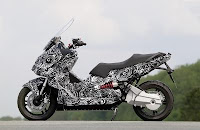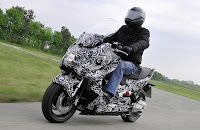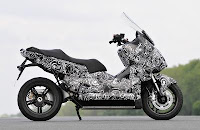BMW E-Scooter concept
Following its Concept C maxi scooter that was unveiled at last year’s Milan bike show, BMW has now revealed the E-Scooter concept. And, as the ‘E’ in the title suggests, it’s electrically-powered.
With any electric vehicle, a critical question is going to be how far it can travel between recharges. For the E-Scooter, BMW is aiming for a range of at least 60 miles (100 km) thanks to a high capacity battery. Recharge time from a fully discharged state will be about three hours.
By comparison, existing electric scooters such as the Econogo Yogo can travel a maximum of 44 miles (70 km), although bikes with larger battery packs will manage more. The Brammo Enertia Plus motorcycle, for example, has a range of 80 miles (128 km).
Given the urban environments in which the E-Scooter will predominantly be used, performance has also been an important design factor. Consequently, BMW’s target has been to match the acceleration of a 600 cc petrol-engined maxi scooter.
An unconventional aspect of the E-Scooter is its construction. While scooters usually have a central frame to which everything is attached, the BMW does without one. Instead, the aluminium battery casing assumes that role, supporting the rear sub-frame, swing arm and front forks.
Drive from the electric motor to the rear wheel is via a belt system. An added benefit is that under deceleration or braking, this set-up acts as an energy regenerator, extending the scooter’s range by between ten and twenty percent.
As it’s just a concept for now, there’s no word on whether the BMW E-Scooter might make it into production. Undoubtedly one of the important issues would be cost, which is something that that high capacity battery unit might be having a significant impact on.
Related posts:
Suzuki’s fuel-cell scooter
BMW Concept C unveiled
Brammo Enertia Plus
Econogo Yogo scooter
With any electric vehicle, a critical question is going to be how far it can travel between recharges. For the E-Scooter, BMW is aiming for a range of at least 60 miles (100 km) thanks to a high capacity battery. Recharge time from a fully discharged state will be about three hours.
By comparison, existing electric scooters such as the Econogo Yogo can travel a maximum of 44 miles (70 km), although bikes with larger battery packs will manage more. The Brammo Enertia Plus motorcycle, for example, has a range of 80 miles (128 km).
Given the urban environments in which the E-Scooter will predominantly be used, performance has also been an important design factor. Consequently, BMW’s target has been to match the acceleration of a 600 cc petrol-engined maxi scooter.
An unconventional aspect of the E-Scooter is its construction. While scooters usually have a central frame to which everything is attached, the BMW does without one. Instead, the aluminium battery casing assumes that role, supporting the rear sub-frame, swing arm and front forks.
Drive from the electric motor to the rear wheel is via a belt system. An added benefit is that under deceleration or braking, this set-up acts as an energy regenerator, extending the scooter’s range by between ten and twenty percent.
As it’s just a concept for now, there’s no word on whether the BMW E-Scooter might make it into production. Undoubtedly one of the important issues would be cost, which is something that that high capacity battery unit might be having a significant impact on.
Related posts:
Suzuki’s fuel-cell scooter
BMW Concept C unveiled
Brammo Enertia Plus
Econogo Yogo scooter






+Front+Side.jpg)
%2BFront%2BSide.jpg)




Comments
Post a Comment